Table of Contents
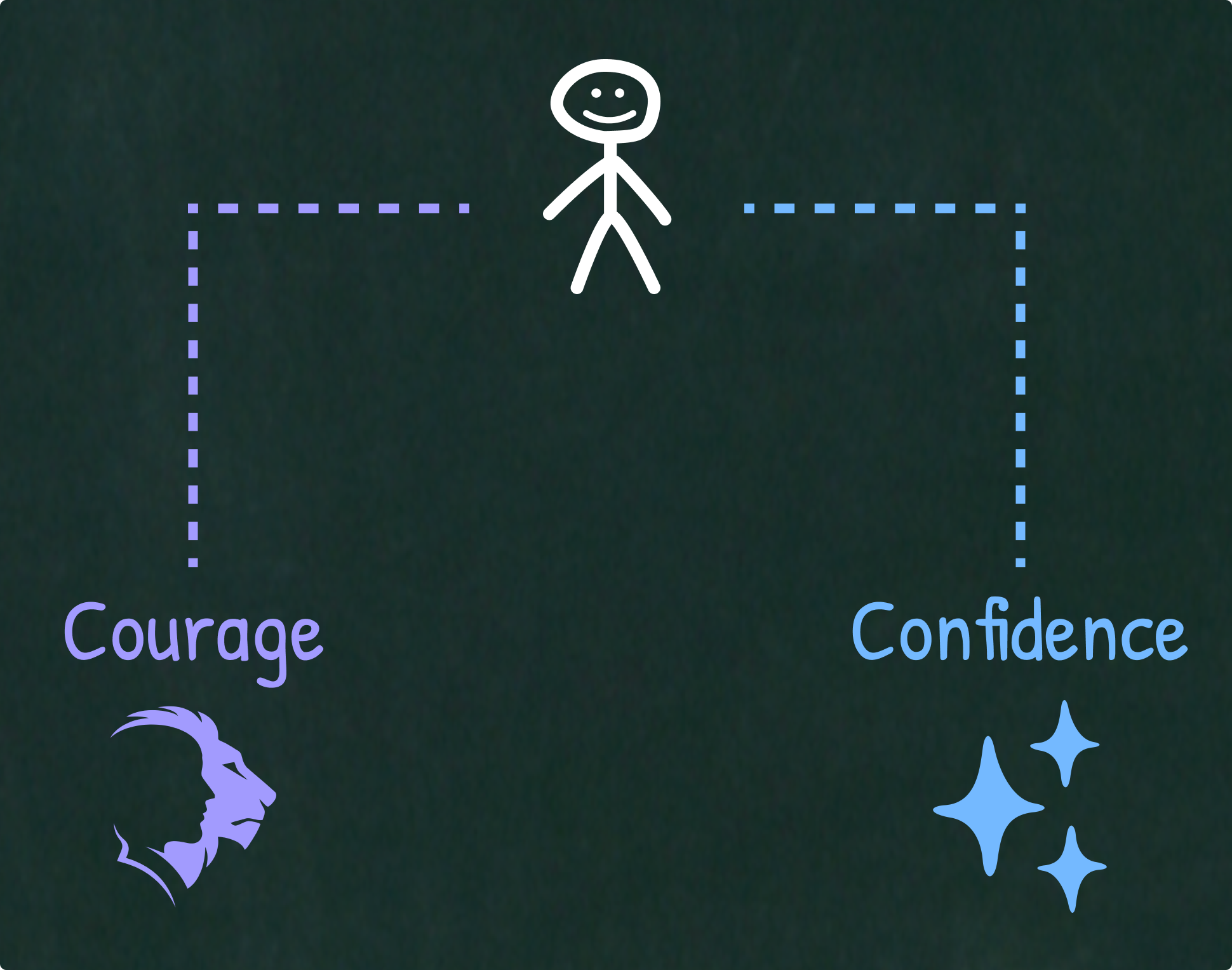
Both courage and confidence are typically considered admirable traits. How someone develops each trait and how one trait fortifies or denigrates the other are reasons why understanding the difference between courage and confidence have deep—very deep—implications.
Many people conflate the two at their own peril. Hopefully, by the end of this essay, you will not be one of those people!
After all, the utility of this knowledge—i.e. fully understanding the deep philosophical differences between courage and confidence—goes beyond simple intellectual satisfaction, and if applied to your life, will give you the foundation to actively develop courage and confidence in a deterministic way.
What Is Courage?
Courage is your ability to make decisions and hold to them in the face of fear. Courage is about what you do, not how you feel.
John Wayne said it well: “Courage is being scared to death and saddling up anyway.”
As Nassim Nicholas Taleb (Author, Former Options Trader, and Risk Analyst) also wrote…
Courage is the only virtue you can't fake.
— Nassim Nicholas Taleb (@nntaleb) August 1, 2017
Courage is not about not being afraid. It’s about doing something despite being afraid. And since displaying courage means that you are confronting your fears, it doesn’t feel good. You’ll probably even sweat and shake, but that’s ok—it’s a byproduct of courageousness.
Stand firm, for it is toil and danger that lead to glorious achievements.
– Alexander The Great (Biography)
[Excerpt from the book Alexander The Great, by Arrian]
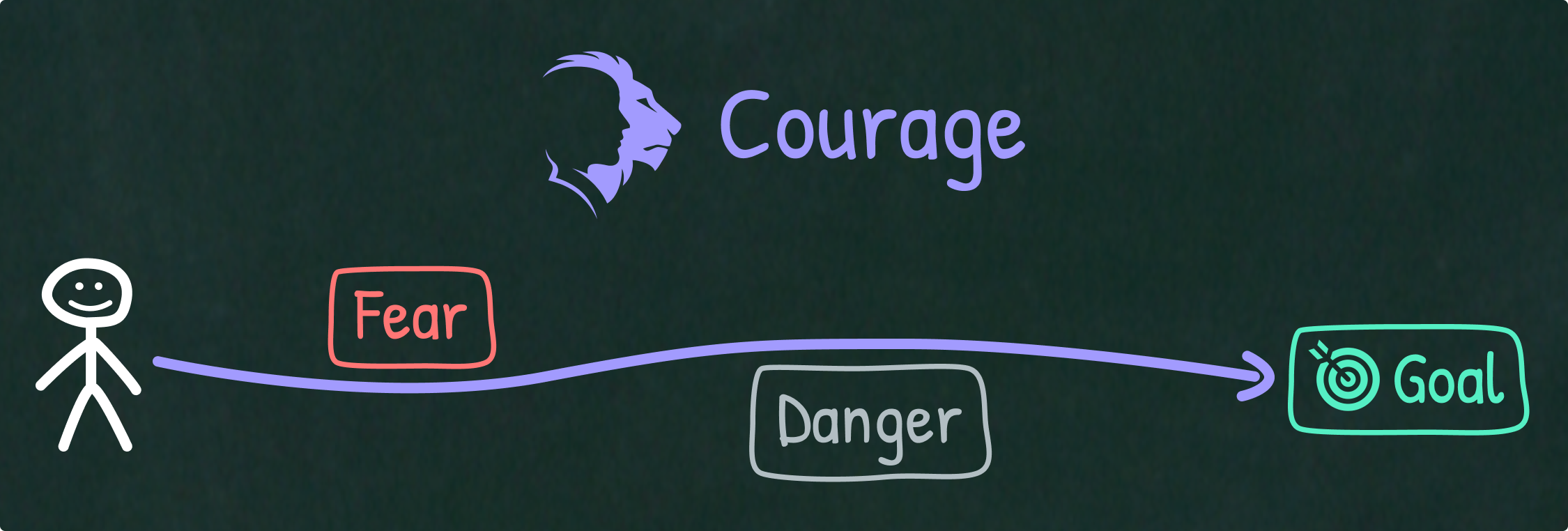
Courage Isn’t Boldness, or Bravery
But courage shouldn’t be confused with boldness—taking risks just for the sake of it. Boldness can be impulsive or attention-seeking. Courage is about standing firm to achieve your ultimate goal.
Courage also isn’t quite the same as bravery. Bravery often tends to be instinctive, reacting quickly in dangerous situations. But courage is more deliberate. And it’s one of Aristotle’s four cardinal virtues (the other three are Prudence, Justice, and Temperance). You don’t just act, you act with awareness of the good.
In his book The Consolations of Philosophy, Alain de Botton illustrates it well with a conversation between Socrates and two Spartan generals—Nicias and Laches.
The generals were attached to one common-sense idea. They believed that in order to be courageous, a person had to belong to an army, advance in battle and kill adversaries. But on encountering them under open skies, Socrates felt inclined to ask a few more questions:
SOCRATES: “Let’s try to say what courage is, Laches.”
LACHES: “My word, Socrates, that’s not difficult! If a man is prepared to stand in the ranks, face up to the enemy and not run away, you can be sure that he’s courageous.”
But Socrates remembered that at the battle of Plataea in 479 BC, a Greek force under the Spartan regent Pausanias had initially retreated, then courageously defeated the Persian army under Mardonius.
SOCRATES: “At the battle of Plataea, so the story goes, the Spartans came up against [the Persians], but weren’t willing to stand and fight, and fell back. The Persians broke ranks in pursuit; but then the Spartans wheeled round fighting like cavalry and hence won that part of the battle.”
Forced to think again, Laches came forward with a second common-sense idea: that courage was a kind of endurance. But endurance could, Socrates pointed out, be directed towards rash ends. To distinguish true courage from delirium, another element would be required. Laches’ companion Nicias, guided by Socrates, proposed that courage would have to involve knowledge, an awareness of good and evil, and could not always be limited to warfare.
In only a brief outdoor conversation, great inadequacies had been discovered in the standard definition of a much-admired Athenian virtue. It had been shown not to take into account the possibility of courage off the battlefield or the importance of knowledge being combined with endurance. The issue might have seemed trifling but its implications were immense. If a general had previously been taught that ordering his army to retreat was cowardly, even when it seemed the only sensible manoeuvre, then the redefinition broadened his options and emboldened him against criticism.
So, let me make the point again that doing things that are seen as “cowardly” acts by others does not mean that you are a coward. Most people don’t know what courage really means. And they are judging solely based on your immediate acts, rather than its interconnection to your ultimate goal. And, by the way, not caring what others think of you is another sign of courage.
Courage isn't charging into a machine gun nest. Courage is not caring what other people think.
— Naval (@naval) March 18, 2015
What Is Confidence (And Is It an Emotion?)
Confidence isn’t an emotion, it’s a belief. Confidence is an opinion that you hold about yourself with regard to a particular activity. You might feel excited, calm, or even anxious while being confident, but the confidence itself isn’t a feeling; it’s a judgment.
You either believe that you are able to do something, or you don’t. It’s as much about knowing your abilities as knowing what you’re not able to do, at least not now.

Displaying confidence feels great because it makes you optimistic about your ability to do a particular thing.
How to Build Courage and Confidence in a Deterministic Way
Before laying out the exact path on how to develop courage and confidence, it’s useful to first understand that there are two levels (level one and level two) of courage and confidence.
Level one is about your courage and confidence in a specific skill or activity. For instance, your confidence in learning a new language, and your courage to take action persistently (in the face of fear and uncertainty) in order to actually learn and master that particular language.
Level two is about your courage to endure anything and your confidence in your ability to learn new skills and adapt. So it’s more about your overall courage and confidence—which is why this level is also called the “meta-level.”
Now, the interesting thing is that to get to level two (where you become more self-confident and courageous in regards to anything), you first need to start on level one. You need to start developing specific (and thus, measurable) skills in order to become more self-confident and courageous.
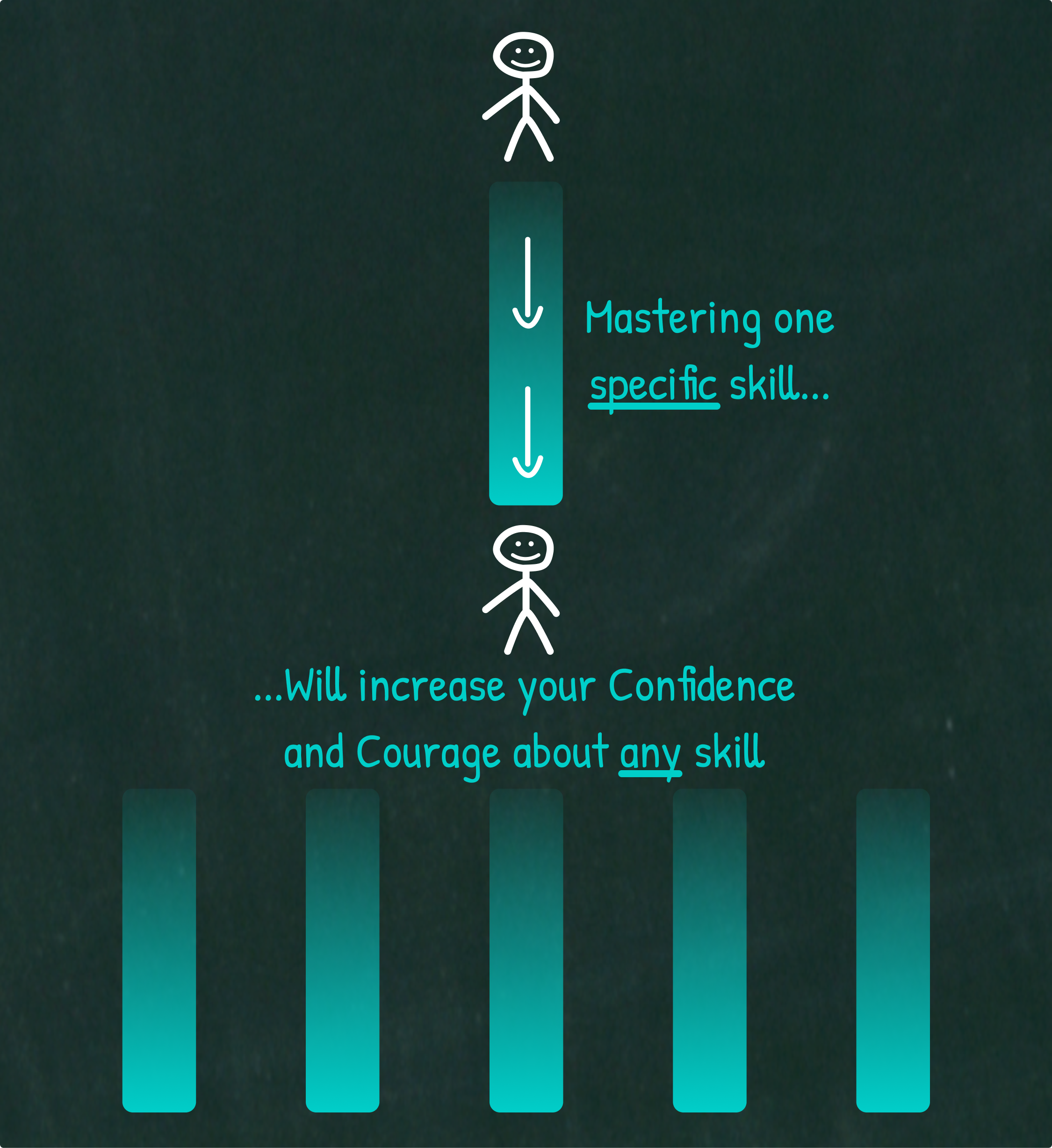
You might be asking: “But why is that? How can learning a specific skill make me more self-confident and courageous in any other skill or area?” And that’s exactly what I’m going explain next.
How to Become More Self-Confident
When you demonstrably improve in one specific area (level one), you become more confident in your ability to master other areas (level two).
This happens because of (at least) 3 reasons:
1. That specific area (where you improve) becomes tangible proof that you can master other areas. This tangible proof will, to some extent, remove your self-doubt about your ability to learn and acquire new skills.
2. When you learn and master a specific skill, your gained expertise is not limited to that specific skill. There are parts of the learning that transmute to the learning of other skills—even for completely unrelated skills. So this gained expertise will make you feel more confident in your ability to learn new skills.
If you know the way broadly, you will see it in everything – Miymoto Musashi excellence in anything increases your potential in everything
— Joe Rogan (@joerogan) December 27, 2009
3. We have a natural tendency to be consistent with past actions and ideas (consistency bias), and when we create a track record of developing and mastering skills we will naturally feel like we have the ability to learn new skills. We create the identity of being someone who is able to learn new things and improve at them.
You can kick-start this process with any skill that you feel sufficiently confident to learn and master. Once you do that, you become more confident in your ability to learn new skills, which will make it easier for you to start learning any new skill. As you can see, this is a self-reinforcing loop. And as you become increasingly more self-confident, you will feel like you can take on more challenging skills, which will again make you even more self-confident.
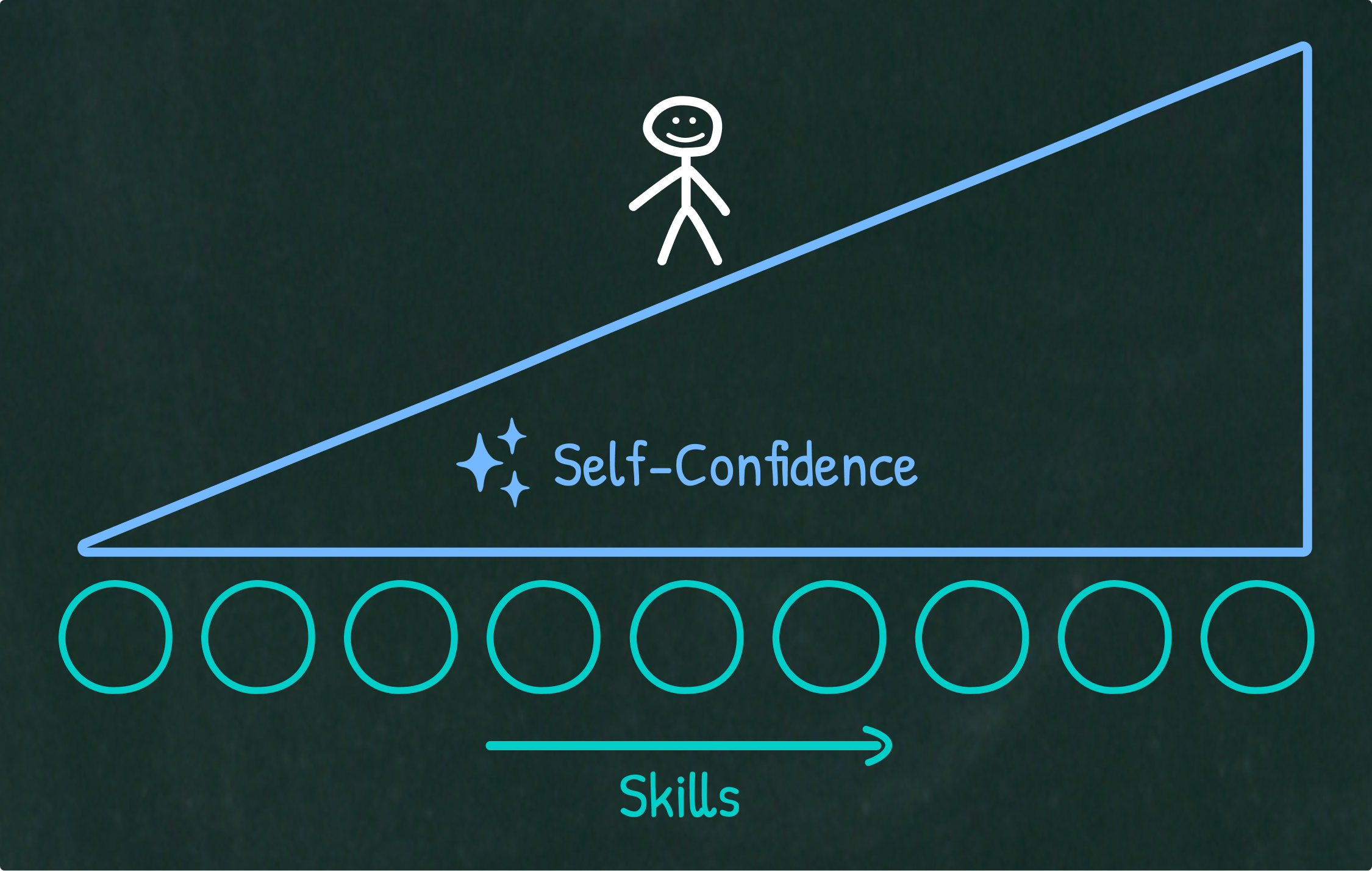
What Comes First: Courage or Confidence?
Although being more confident will make it easier to decide to learn something new, it is courage that you will need to take action (in the face of fear) to master the skill eventually. So, you can’t become more confident without first becoming more courageous.
How to Become More Courageous
Let’s say you are confident enough in your ability to learn Spanish (for example). That’s great, because this confidence got you to start learning!
But confidence is not what’s going carry you when you are faced (time and time again) with adversities on the path to mastering the skill. The only thing that can get you through the fear and danger—which comes naturally from doing something new and uncertain—is courage. And the epitome of courageousness is your relationship with that fear.
Now, in the example of learning Spanish, you can definitely make it easier. For instance, you can face less fear and danger (in terms of being embarrassed) by practicing with strangers (instead of people you’re close to). This is one of the reasons people go to open table language exchanges—because they are “low-risk” environments with strangers.
But you become more courageous by actually displaying courage—by standing firm in the face of fear. So even if, let’s say, you are not courageous enough to practice Spanish with people you know, you should still stimulate and grow your courage “muscle.” And it doesn’t matter where you cultivate that courage (level one), because it will transmute across everything that you do (level two or “meta-level”).
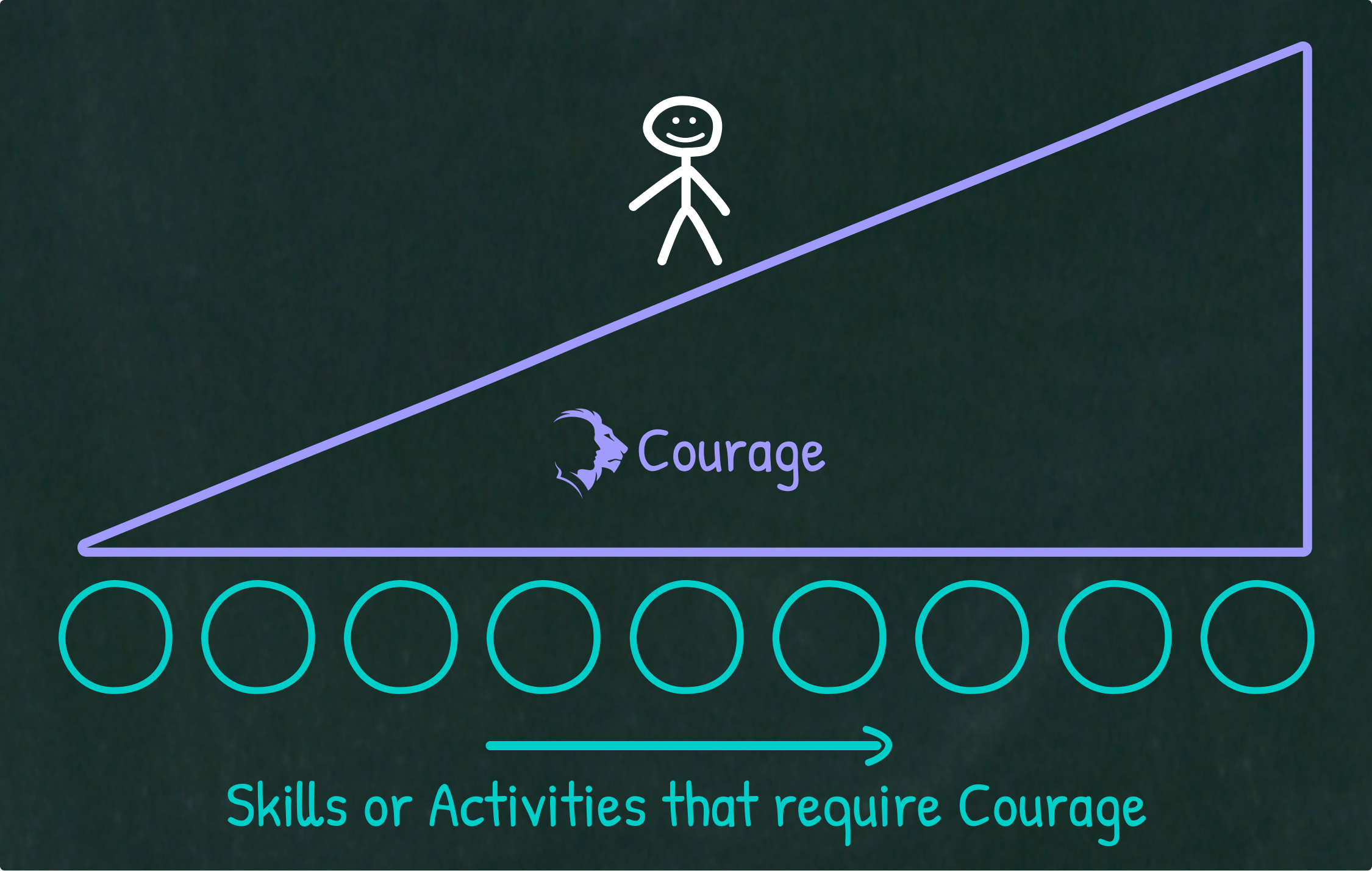
Let’s take another real-world example: Bungee jumping.
As someone who has a healthy fear of heights, I don’t particularly like bungee jumping—at least not in the same way that I like chocolate ice cream. But I do like the surge of adrenaline and, more importantly, the bolstering of my courage “muscle” after I’ve made it back to the platform post-jump.
Standing on the platform with a bungee cord attached to my ankles, every part of my rational brain screams “This is a bad idea!” The fear is real. Yet, having seen others do it and having jumped myself before, I have the confidence that I can do it and survive. And I know from past experience that, after “saddling up” as John Wayne would say, I’ll be more courageous in other areas of my life.
If you want to get inspired by one of the most courageous individuals in history, look no further than Winston Churchill. In his biography Churchill, Paul Johnson wrote:
Churchill never allowed mistakes, disaster—personal or national—accidents, illnesses, unpopularity, and criticism to get him down. His powers of recuperation, both in physical illness and in psychological responses to abject failure, were astounding. To be blamed for the dreadful failure and loss of life in the Dardanelles was a terrible burden to carry. Churchill responded by fighting on the western front, in great discomfort and danger, and then by doing a magnificent job at the Ministry of Munitions. He made a fool of himself over the abdication and was howled down by a united House of Commons in one of the most savage scenes of personal humiliation ever recorded. He scrambled to his feet and worked his way back.
He had courage, the most important of all virtues, and its companion, fortitude. These strengths are inborn but they can also be cultivated, and Churchill worked on them all his life. In a sense his whole career was an exercise in how courage can be displayed, reinforced, guarded and doled out carefully, heightened and concentrated, conveyed to others. Those uncertain of their courage can look to Churchill for reassurance and inspiration.
Final Thoughts: Train Your Courage Muscle, Earn Your Confidence
If you have an area of your life in which you’re not thrilled with the outcome you’re getting, look at the interplay between courage and confidence and consider the different levels I described.
What can you do today to bolster your courage “muscle”? This is where the concept of, “Do one thing a day which scares you,” comes from.
What can you do today to build up confidence in your abilities? What new skill would you like to learn, or what existing skill of yours would you like to improve?
Writing publicly for me is a skill I would like to improve, hence why I’m doing this. I’m also a bit afraid to offer advice in these areas, perhaps due to imposter syndrome, but I try to stand firm on my decision.
In summary, the way to become more confident and courageous is by mastering specific skills and training your courage “muscle.”
If You Liked This Essay, Check Out These Books
- The Consolations of Philosophy by Alain de Botton
- Churchill by Paul Johnson
Warrior Mindset Quotes: The Importance of Overcoming Obstacles
The warrior mindset is something often sought after by those seeking self-actualization. In a world largely bereft of opportunities to be a real warrior, we seek to leverage the mindset…